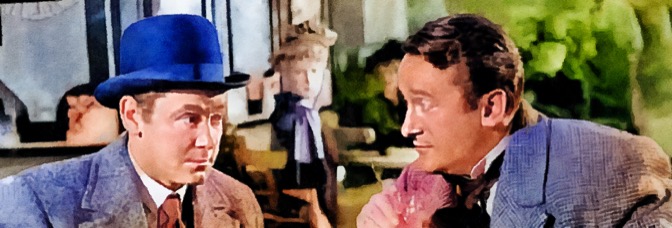The Moon and Sixpence has a number of serious problems, all of them the fault of director and screenwriter Lewin. As a director, while never spectacular, Lewin manages some competence and ambition. He tells Moon and Sixpence in a series of summarized flashbacks. Those flashbacks, narratively and budgetarily effective, end up being the film’s undoing.
The film opens with a text scroll informing the viewer it is about a famous painter, Charles Strickland. Charles Strickland, however, is not a real painter. He’s fictionalization of Gauguin. The source novel is first person, from the perspective of that novel’s author, W. Somerset Maugham. Herbert Marshall plays that “character,” only he’s not playing Maugham, he’s got a different name. So it was always supposed to be about a fictionalized version of real person, told by a fictionalized version of an author, but Lewin’s adaptation presents the fictional painter as a real person and the real author as a fictional one.
George Sanders plays the painter, Herbert Marshall plays the author. Even though the film starts with Marshall directly addressing the viewer about his plans to write a history of Sanders, Lewin eventually abandons Marshall entirely. It’s a problem since it’s supposed to be him telling the story… and it gets even worse when there’s an end text scroll to wrap things up. Why’d we need Marshall?
Well, Marshall’s needed because someone needs to do the acting. Sanders is good, but he’s barely in the film. He’s the subject of it, after all, and it’s structured as Marshall’s pursuit of him. There are only a handful of bad performances–but two of them, Doris Dudley and Molly Lamont, are extremely important because they’re the women in Sanders’s life. Lewin’s not a good director of actors; he tries to avoid them with the summarized flashbacks. Lots of voiceovers from Marshall, which eventually give way to voiceovers from people telling their story to Marshall.
A flashback in a flashback in a flashback.
Most of the film relies on Marshall, with occasional bursts of energy from Sanders. Maybe more than an hour of it (Moon and Sixpence runs ninety minutes). There are significant supporting cast members–Dudley and Steven Geray–but Marshall and Sanders are the salient points. Geray’s a caricature. Dudley doesn’t even get to be a caricature (similar to Lewin’s handling of Lamont). It should all be about Sanders, except since Lewin’s not adept at directing performances–not even good ones–Marshall ends up carrying the picture. He’s around the most.
Until the end. In the end, when the action moves to Tahiti, both Sanders and Marshall become detached thanks to the flashback structure. Instead of Marshall telling Sanders’s story, Marshall is telling his own story of hearing about Sanders. Maybe if Albert Bassermann and Florence Bates were better–both are mostly fine, Bates is even fun, but the parts are way too thin–their narratives would be more effective. Or maybe Lewin’s finally just ran out of rope as he lengthens the narrative distance more and more from Sanders.
Either way, just when Lewin needs to build something up for Sanders, he cuts and runs. Moon and Sixpence comes up short.
Eric Blore’s got an amusing, if pointless small part. Elena Verdugo is almost good as another woman in Sanders’s life. She’s certainly better than Dudley and Lamont; maybe she just ignored Lewin’s direction.
John F. Seitz’s photography is fine (he does well with the many projection shots neccesarily to put the cast in Paris and Tahiti). Dimitri Tiomkin’s music is a little much. Maybe if the film were more effective, the music would match, but the film’s ineffective and the music just draws attention to its failings.
The garrish Richard L. Van Enger editing doesn’t help things either.
The Moon and Sixpence seems like it should’ve given Sanders and Marshall great roles, but it doesn’t. Lewin inartfully treats Marshall like a narrative device and Sanders like a guest star. It especially disappoints with the failed conclusion, just because the film had been successfully coasting on its leads for so long, all Lewin needed to do was not botch the third act too much.
But he does botch it too much. Way too much.

Leave a Reply